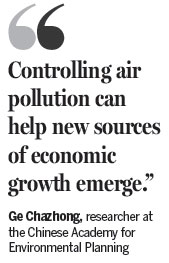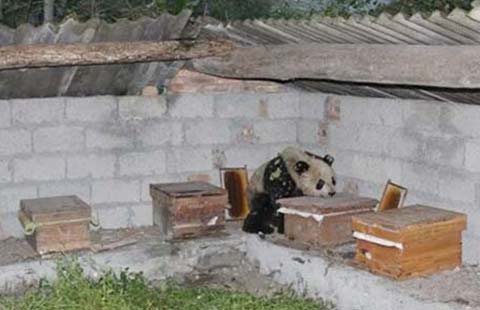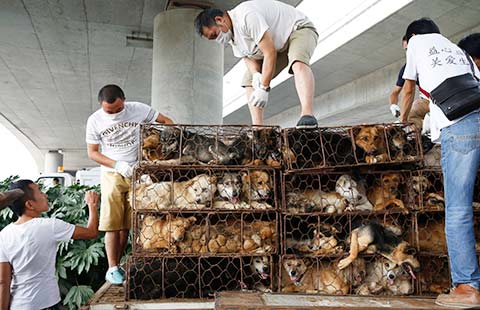Tight pollution controls affect major industries
Updated: 2015-09-10 07:52
By Zhang Yu and Wang Wei in Shijiazhuang(China Daily)
|
||||||||
Heavy industry in Tangshan, Hebei province, has been hit by efforts to control air pollution, with the value of its output dropping by 35.3 billion yuan ($5.5 billion) in the past two years, according to the Ministry of Environmental Protection.
That accounts for about 5.7 percent of the city's GDP in 2014, according to Tangshan's bureau of statistics.
Under pressure to curb pollution, the city has shut down 2,382 companies involved in the iron, steel, cement and coking industries.
It also lost 10 billion yuan in less than 10 days due to stopped or restricted production for 242 companies during the Asia-Pacific Economic Cooperation meeting held in Beijing last year.
Along with Tangshan, six other cities in Hebei - Xingtai, Handan, Shijiazhuang, Baoding, Hengshui and Langfang - were listed among the most-polluted cities in the country.
In the face of serious air pollution, Hebei has been asked by the central government to reduce 60 million metric tons of iron and steel production - 75 percent of the nation's target - and 61 million tons of cement capacity by the end of 2017, as well as 40 million metric tons of coal consumption.
In 2014, production of about 15 million metric tons of iron and steel and 39 million tons of cement was cut, and coal consumption was reduced by 15 million tons.
As a result, the average concentration of PM2.5, airborne pollutants with a diameter of 2.5 microns or less, decreased by 12 percent in Hebei last year.

Some Hebei officials have claimed the measures have caused the economy to slow down.
In 2014, the GDP of the province grew by 6.5 percent, lower than the national 7.4 percent.
"The influence of controlling air pollution on the economy exists, but it's very limited, " said Ge Chazhong, a researcher at the Chinese Academy for Environmental Planning under the Ministry of Environmental Protection.
According to Ge, the production capacity of these heavy industries is still excessive, and the utilization rate of productive capacity is less than 70 percent.
In addition, most of the eliminated production capacity came from already-struggling enterprises in the province, which would have little effect on the economy.
"On the contrary, controlling air pollution can help new sources of economic growth emerge, such as the environmental protection industry and new energy industry," Ge said.
Contact the writers through zhangyu1@chinadaily.com.cn
(China Daily 09/10/2015 page4)
- Hohhot overseas student pioneer park, core of 'Grassland Silicon Valley'
- Tight pollution controls affect major industries
- Tianjin announces pensions for martyred firefighters' families
- TCM tonic herb 'can kill HIV', study finds
- Intl Helicopter Exposition kicks off in Tianjin
- Premier Li commends nation's teachers
- Russian military experts present in Syria
- Norway PM says Norwegian citizen taken hostage in Syria
- Hungarian TV journalist fired for tripping up fleeing migrants
- Leaders from EU, Russia, Ukraine to meet in Paris in Oct
- Music is food for the soul for young Chinese violinist
- Australia's Tasmania, China agree to 'work together' on Antarctic expeditions

 Greedy panda eats ten boxes of honey
Greedy panda eats ten boxes of honey
 Soldiers in Sansha guard the islands
Soldiers in Sansha guard the islands
 Dunhuang heritage still alive in new age
Dunhuang heritage still alive in new age
 Bigger iPad announced at Apple 'monster' event
Bigger iPad announced at Apple 'monster' event
 World's largest mural on a giant rooftop
World's largest mural on a giant rooftop
 Starry Night: Van Gogh in Beijing
Starry Night: Van Gogh in Beijing
 Dog rescue leads to self-stabbing
Dog rescue leads to self-stabbing
 Serena vs Venus: Sibling rivalry as usual
Serena vs Venus: Sibling rivalry as usual
Most Viewed
Editor's Picks

|

|

|

|

|

|
Today's Top News
Inside look at Apple's newly-launched products
Peking Opera performance thrills NY
Chinese man, daughter arrested in alleged marriage scam
China's CPI up 2% in August
Hillary Clinton's lead eroded by Joe Biden's surge in poll
Apple TV comes with 'apps'; big iPad aimed at business
China aims to be first to land on far side of moon
Renowned scroll painting unrolled at the Palace Museum
US Weekly

|

|







